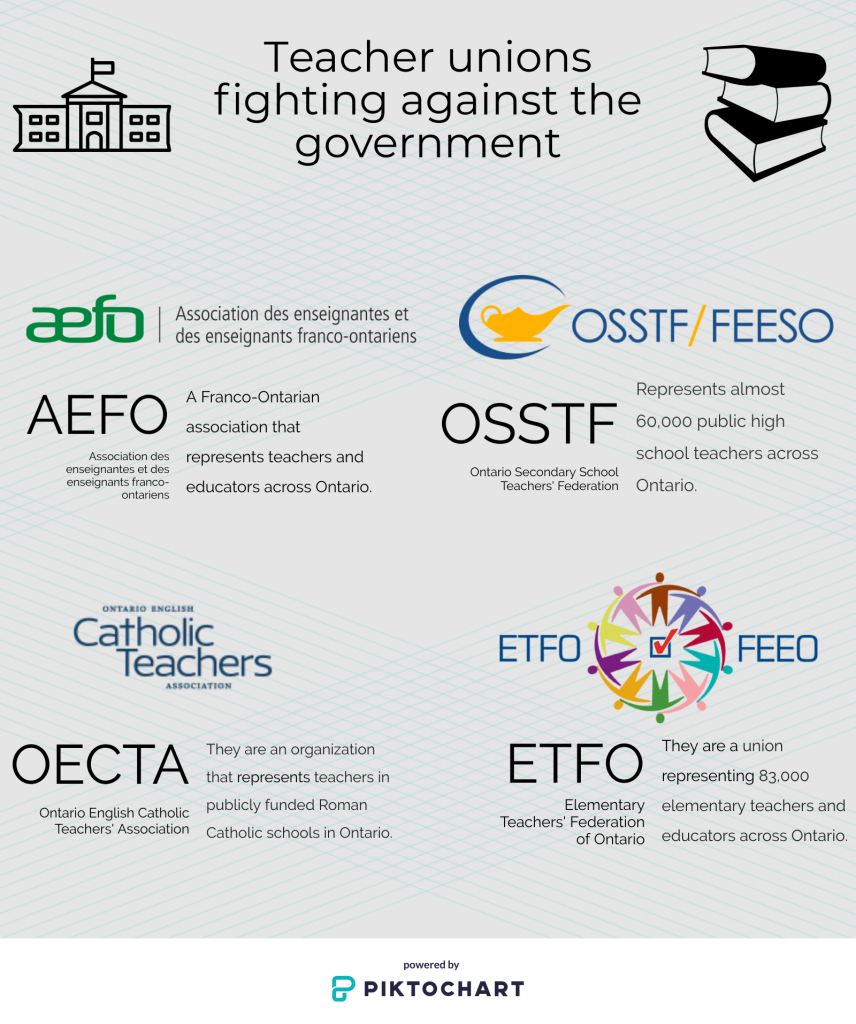The teachers’ strike: questions and answers with both sides
BELLEVILLE – Slogans and ad campaigns have filled Ontario’s media in recent months as the bitter contract negotiations between elementary and high-school teachers and the provincial government have ground to a halt and a series of one-day strikes have kept kids out of school. QNet sought to clarify the positions of both sides.
The unions are citing larger class sizes and lower staffing levels, as well as mandatory e-learning classes, as some of the main obstacles. The government says the breakdown in negotiations is due to teachers wanting their salaries increased.
The teachers are asking for a two-per-cent raise that they say accords with the rate of inflation. Last fall, the government capped public-sector raises at one per cent a year for three years.
The unions involved are the Ontario Secondary School Teachers’ Federation, the Elementary Teachers’ Federation of Ontario, the Ontario English Catholic Teachers’ Association and the Association des enseignantes et des enseignants franco-ontariens. They represent all public and Catholic schools in the province.
QNet News spoke this week with Harvery Bischof, the president of the OSSTF, and Ingrid Anderson, a spokesperson for the Ontario Ministry of Education. We asked both the same questions with the goal of giving students, parents, teachers and concerned citizens the unadulterated view of both sides.
Q: What would you say is the main issue preventing a contract from being reached?
Bischof:
There are several significant outstanding issues. I could encompass them all under the heading of quality of education issues – which would incorporate class size, incorporate the number of education workers and mandatory e-learning.
Anderson:
The bargaining team has put forward reasonable proposals at the negotiating table and it is disappointing to see teachers’ union leaders advance higher compensation, including more generous benefit plans at the expense of student learning.
Q: Who would you assign blame to for the current logjam in negotiations?
Bischof:
It’s very simple for me, when you consider that going back to almost a year ago to March 15, the government announced its intention to eliminate one out of four high-school teaching positions, eliminate thousands of education worker jobs and impose an Alabama-style mandatory e-learning on students. They basically launched an assault on publicly funded education going back almost a year ago and have not abandoned that destructive course.
Anderson:
We continue to call on teachers’ union leaders to come back to the bargaining table with a reasonable offer that achieves our shared objectives and is in the best interests of student learning.
Q: What is something you would want to say to the other side today?
Bischof:
I would like the other side to explain why Ontario this year can’t afford the same high quality of education that we were able to afford just last year. What is it that has changed within the province that would make it necessary to save money on the backs of our students and thereby imperil their future opportunities and Ontario’s future economy?
Anderson:
We have reached two ratified central deals (with non-teaching education workers and francophone teachers in northern Ontario) because the parties were reasonable in their positions. We continue to call on teachers’ union leaders to come back to the bargaining table with a reasonable offer that achieves our shared objectives and is in the best interests of student learning.
Q: Are you sympathetic to the other side’s perspective?
Bischof:
I’m not at all. I’m sorry to have to say that, and if we were having a principled disagreement about what’s best for students I would be in a different position, but we have a minister of education who deliberately misleads the public about what the issues that are on the bargaining table while pursuing the reduction of services for our students. In a shortsighted agenda, that will ultimately risk future students’ opportunities. I just can’t sympathize with that.
Anderson:
Our government has put forward reasonable proposals at the negotiating table, including a commitment to maintain full-day kindergarten, and it is deeply disappointing parents are still seeing repeated escalation at the expense of our students to advance higher compensation, including more generous benefit plans. We firmly believe students should be in class, and we continue to stand ready to negotiate and reach a deal Ontario students deserve

All four of the major Ontario teachers’ unions will be taking part in rotating strikes and limited withdrawal of services throughout February. All Ontario elementary and high-school students will be out of school Feb. 21.
 Print This Post
Print This Post






